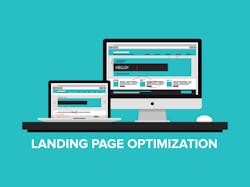Landing pages versus web pages: Clarity for the marketing dentist
If you're not using landing pages in your marketing efforts, you're missing a monstrous opportunity. You're probably wasting money, too, by directing people to places they don't want to go to online. Learn more in Sean Hamel's video and article below.
Nearly every dental practice has a web presence these days. It's common sense, right? Those same practices likely spend hundreds or even thousands of dollars each month on digital marketing, print marketing, direct mail, paid search, etc. That's really great and all, but when it comes to marketing, the key to any kind of return on investment (ROI) is getting the traffic you generate to convert to actual, tangible new patients.
A lot of dentists I meet don't have any real rhyme or reason for what they're doing marketing-wise. They just "want new patients." Or, "a buddy had great success in his or her practice with this or that, so we're doing it." Do yourself a favor right now—before you do anything else with your practice marketing. Write down actual goals and a plan for the marketing dollars you're spending. For instance, with paid search or direct mail, the goal is to raise awareness and drive traffic toward your dental practice. Right? However, are you driving traffic to a particular page, or just routing people to your generic web address? What if I told you there is a huge benefit to building a specific landing page over your using your home page? Let's keep going!
Web pages versus landing pages
What's the difference between a web page and a landing page? Let's first have a look at your average dental website.
The practice likely has "www.mypracticename.com" or some variation as the site domain. The practice probably (albeit hopefully) has a contact form of sorts, a few photos of the staff and the practicing doctor(s), addresses and phone numbers, a map, some downloadable patient forms, etc. Sound familiar? Your website and the pages it contains (the homepage, especially) are essentially digital placeholders. They are a comprehensive outline of your practice and staff. They give web traffic a lot of general information and provide a number of ways for patients to get in touch with you, follow you on social media, leave reviews, read reviews, etc. Put another way, a web page is a permanent component of your website. Here are some common examples:
- Home page
- About us
- Meet the doctor
- Services
On the other hand, a landing page is a type of web page that is built with a very specific purpose. You've likely encountered many in your digital life. A great landing page serves a simple purpose: to convert traffic by providing pertinent information relevant to a specific service, content, topic, etc. The page is designed specifically for that audience. The landing page does not include any kind of clutter or distraction. Whatever your goals are, a landing page will drive and convert traffic. Period. The page features one clearly defined action. There is one clear set of information readily available, and it is easy to scan and read. There are no navigation options. No frills. Nothing unnecessary. Are you starting to see the difference?
Uses for landing pages
When and why should you use a landing page? When you want your audience completely focused on the task at hand, use a landing page. A good landing page will be targeted to a specific audience. That audience may come from a variety of places (paid search, mailers, community outreach, etc.). You will want to offer the audience value. What are they searching for? Is it a specific service? Technology? Treatment? Give your searching audience the information they want and need! Practices that employ this tactic see much higher ROI on their marketing dollars and greater increases in new patient numbers than those who stick to the "dump them on the homepage" routine.
If you're running paid search for certain services, your searchers who click those ads want information relative to said ad. For instance, if a patient is researching a root canal and clicks on your ad because you're the Michael Jordan of root canals, you want to send that traffic to a landing page. (Not your homepage!) Outfit the landing page with content about root canals, why you are the doctor the searcher should choose to see, and a contact form to easily get in touch with your practice. Nothing else. Focus the user on what you want them to do. If Johnny Doe needs a root canal, sees your ad, then clicks on it, why would you dump him on your generic home page? Why not give him the info he wants? It's a missed opportunity if you don't. If the information on the search isn't readily available on your home page, the traffic will not hang around to search for it. It happens all the time in the dental world, and it has to stop!
Help patients make buying decisions
Remember, the buying decision in dental is much different that any other health-care vertical. Most traffic is likely calling or searching for you because something hurts, chipped, broke, or fell out. There is stress, discomfort, and usually a degree of urgency involved. Keep that in mind and make it easy for searchers to get what they want. Cater to them and watch your conversion rate rates start to climb.
Some great uses of a landing page would be:
- A discounted rate for a specific treatment
- Same-day or emergency dentistry capability
- Certain orthodontic treatment, like Invisalign or Clear Correct
- Signing up for a mailing list
- Providing a review for the practice
- Whitening specials
Web pages have a purpose too
Now, does a web page (like your home page) serve an important purpose? Of course it does. I am not discrediting a beautiful, responsive website for your dental practice. It's a necessity. Just remember, a web page for your website and a landing page for a service are two very different animals. Depending on the goals of your practice, you may want to reevaluate the current state of your marketing strategy.
Final thoughts
If you're not seeing the web traffic conversion rate you want, find out where your click-through traffic is being routed. I’d guess it’s just dropping traffic on your home page. You don't need to reinvent the wheel here. Many offices already have service-specific pages that can suffice for a "landing page," although the site navigation capabilities may keep conversion a bit lower. Try adding a landing page to your current marketing strategy and watch it start to work your practice!
Author bio
Sean Hamel is a seasoned dental marketing professional and the founder and CEO of GrowPracticeGrow Dental Marketing (GPG). GPG is a team of dental marketing experts focused on driving new patient inquiries in congruence with optimizing recall and reactivation strategies, ensuring intentional and sustained growth and profitability. GPG designs clean, responsive mobile websites and custom content, along with developing video strategy and highly-targeted local marketing campaigns. Sean can be reached at [email protected].
Also by Sean Hamel
Dental Practice Marketing: Be a solution, not a service
Dental marketing essentials: Web analytics and your dental practice

